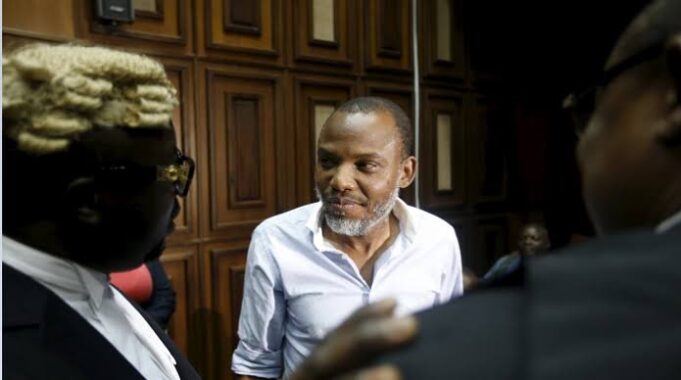Detained leader of the Indigenous People of Biafra (IPOB), Nnamdi Kanu, has lodged an appeal against a Federal High Court (FHC) ruling in Abuja, which dismissed his objection to the continuation of his trial.
In a notice of appeal dated and filed on March 28 by his legal team led by Aloy Ejimakor, Kanu petitioned the Court of Appeal in Abuja to hear his appeal and overturn the decision of the trial court.
 Advertorial
Advertorial
The IPOB leader had initially filed a preliminary objection, seeking specific conditions to be met by the Federal Government before his trial at the FHC could proceed. Among his grievances were allegations of interference by the Department of State Services (DSS) personnel, who purportedly seized his lawyers’ documents during visitations, obstructed note-taking, and eavesdropped on consultations regarding his defense.
Kanu contended that these actions violated his right to fair trial as guaranteed by Section 36(6)(b) of the 1999 Constitution (as amended).
However, Justice Binta Nyako of the FHC rejected Kanu’s objection in a ruling on March 19, ordering an expedited hearing of the trial and dismissing his bail application.

In his appeal, Kanu listed the Federal Republic of Nigeria as the sole respondent, arguing that the trial court erred in assuming jurisdiction to proceed with the criminal trial despite the blatant denial of his constitutional right to a fair trial.
He further asserted that the lack of adequate facilities for preparing his defense and the denial of his choice of counsel constituted a grave miscarriage of justice.
“The denial of the appellant (Kanu) the opportunity to interact and brief his counsel on what line of defences the appellant tends to agitate in the trial court and rely on was adequately brought to the attention of the trial court by motion.

“The trial court failed and neglected to make necessary orders that would protect the appellant’s aforesaid rights but rather held that the court cannot dictate how the respondent carries out its work,” he said.
He said the trial court had the power to order the respondent to cease and desist from interfering with his constitutional right.
Besides, Kanu said the lower court had the power to order an alternative custodial arrangement or non-custodial arrangement for him, where it is impossible for the respondent to comply or where the respondent persists in the act.
He said: “Denial of the appellant’s right to adequate facilities to prepare defence as enshrined in Section 36 (6) (b) of the 1999 Constitution is a jurisdictional issues in the absence of which the trial court cannot assume or proceed with the jurisdiction over the case unless and until such facilities are accorded to the appellant.”

In his appeal, Kanu argued that the trial court possessed the authority to compel the respondent to cease and desist from infringing upon his constitutional rights.
He asserted that the lower court could have ordered an alternative custodial or non-custodial arrangement in cases where compliance was impossible or if the respondent persisted in their actions.
Highlighting the significance of adequate facilities for defense preparation, Kanu emphasized that the denial of such facilities constituted a jurisdictional issue, rendering the trial court incapable of assuming or proceeding with jurisdiction until those facilities were provided.
Despite his pleas to halt the alleged unconstitutional acts of the Department of State Services (DSS) and their interference with his legal documents, Kanu lamented the trial court’s refusal to grant his request.

Kanu criticized the trial judge for ordering accelerated hearing despite consistent denials of his right to adequate facilities for defense preparation and his right to counsel. He argued that this accelerated hearing order endorsed the unconstitutional denial of his fair hearing rights.
In light of these constitutional breaches, Kanu implored the appellate court to allow his appeal, vacate the ruling of the lower court, and demand that the trial court refrain from proceeding until his fair hearing rights under Section 36(6)(b) and (c) of the constitution are upheld. Alternatively, he requested an alternative custodial or non-custodial arrangement devoid of infringements on his rights.

He sought to set aside the order for accelerated hearing, asserting that such proceedings should be halted until he is provided with the necessary facilities for defense preparation and unrestricted access to legal counsel.
Kanu however requested a stay of proceedings until the respondent ensures he is afforded constitutional safeguards for a fair trial.

















